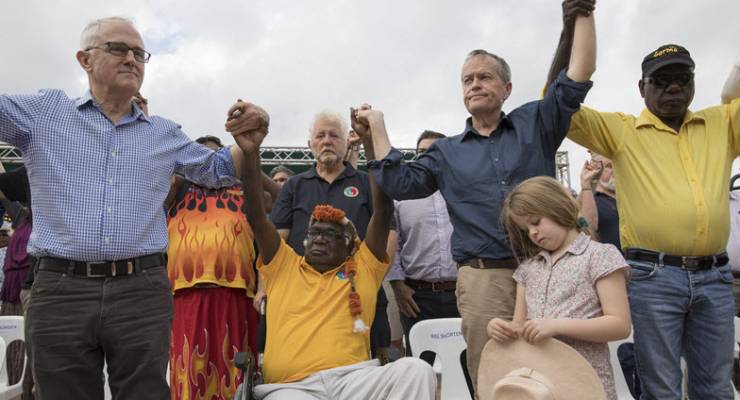
The process for constitutional recognition of Australia’s first peoples may well be dead after the government’s rejection of the Uluru statement as “undesirable”. Australia’s Indigenous peoples have been told that their view — that symbolic constitutional change was insufficient, and needed to be coupled with a mechanism to provide an ongoing voice in debates affecting them — doesn’t count.
How much Indigenous support there will be for a symbolism-only change remains to be seen. Once tempers cool, support for what is being portrayed as the “realistic” option of symbolism-only may resurface. Or the high-handedness with which white Australia sought the views of Indigenous people and then rejected them as “undesirable” (quite why Malcolm Turnbull thought that was an appropriate word to use is anyone’s guess), might permanently alienate many Indigenous leaders from the whole process.
In his response yesterday, Turnbull accused Indigenous leaders of adopting a “take it or leave it” approach. In fact, it is white Australia that has said that: Indigenous people can have a symbolic change and some nice words in a white Australian document, or they can have nothing.
Turnbull’s response also recycles the idea that the Uluru statement proposed a “third chamber” — a lie peddled by Deputy PM Barnaby Joyce in the immediate aftermath of the statement. “It would inevitably become seen as a third chamber of Parliament,” Turnbull said yesterday. “The Referendum Council noted the concerns that the proposed body would have insufficient power if its constitutional function was advisory only.” You’ll note the implication here — indigenous people want more than a merely advisory body so it will therefore be some sort of “third chamber”.
All of these issues and more are canvassed by Noel Pearson’s Cape York Institute for Policy and Leadership in a paper to the Referendum Council that outlines the ways in which a body that is clearly and constitutionally subordinate to parliament could be established, and in a way that satisfies constitutional conservatives. Such a body would clearly be no “third chamber” or anything remotely resembling that. If a hard-right figure like Chris Kenny can back an Indigenous voice, it demonstrates how this need not be an ideologically divisive issue but one that progressives and conservatives, black and white, can get behind, if there’s political will.
If this rejection of meaningful constitutional change prompts an Indigenous rejection of symbolic change, it will kill the chances of a successful referendum — ironically, the very reason Turnbull cites as his reason for rejecting an Indigenous voice. And that will delight the bigots, far right and groups like the Institute of Public Affairs, who have, as part of an effort to exhume terra nullius from the grave to which Mabo rightfully consigned it, argued that it’s somehow “racist” to recognise that Australia was occupied before white settlement and that its inhabitants deserve recognition in the nation’s foundational document. And 230 years after the beginning of white invasion, we’ll remain without any recognition that this is an occupied land.








Noel Pearson’s passionate analysis of the LNP’ gutless and racist devision on RN Drive yesterday worth hearing. Another reason why this deplorable bunch of fools and scoundrels are resting on the edge of the dustbin of history.
“If only Tony was still PM!”?
Metamorphosis complete – arise the common clothes moth – “Turnbulla bisselliella(?)”……. he’ll sell anything.
If this is a victory for the far right, one can only conclude that Turnbull is now, and always has been, a fully paid up member of that grouping.
No, Melting Truffle’s a paid-up member of “Remaining Dear Leader No Matter the Cost”. If it was the Greens who had him tied up in their cellar, we’d have a carbon price.
John Howard refused to say sorry. Turnbull Turncoat has emulated him under pressure from the far right of his party and Pauline Hanson rednecks. This is another sad nail in the ’Liberal’ casket. A more enlightened future government will hopefully bury that casket in the White Australia Cemetary.
John…Bill Shorten and the Labor Party have already said they will proceed with the wishes of the indigenous people, as expressed at the Uluru congress.
No doubt there will be much discussion to follow, but at least it will be a start.
Not all is lost just yet.
Indigenous recognition has been overshadowed by the wretched SSM plebiscite and attendant frenzy. No chance of another “referendum” getting up hot on its heels.